小学英语六年级全册语法重难点讲解集合
人教版小学六年级总复习英语语法知识最全整理+语法专项训练题

小学英语语法知识最全整理+语法专项训练题一、小学英语语法知识最全整理第一章名词(Noun)名词的概念在生活中,我们会接触到各种各样的人和事物,用来表示这些人或事物名称的词就是名词。
一、名词的数名词的数指名词的单数和复数形式。
可数名词表示“一个”时用单数,“两个以上”时用复数;不可数名词表示量时,通常用“数词+单位+of+物质名词”的形式,如 a piece ofbread (一片面包),变为复数时,只须将单位名词变为复数,如:two pieces of bread(两片面包)。
*名词复数的构成法则1. 一般情况下在词尾加 s. 词尾读音shop --- shops (商店) 在清辅音后读 [ s ]bag --- bags (书包) 在浊辅音后读[ z ]window --- windows (窗户) 在元音后读 [ z ]2. 以 s, x, sh, ch结尾的单词在词尾加es。
class --- classes (班级) 词尾读音[ iz ]box --- boxes (盒子)match --- matches (比赛)brush --- brushes (刷子)3. 以“辅音字母 +y”结尾的词,变y为 i 加es.story --- stories (故事) 词尾读音[ iz ]4. 以“元音字母 +y”结尾的词,在词尾直接加skey --- keys 词尾读音[ z ]monkey --- monkeys5.以“o”结尾的名词,复数一般在词尾加“s”,但个别加“es”tomato --- tomatoes (西红柿) 词尾读音[ z ]potato --- potatoes (土豆)zoo --- zoos (动物园)photo --- photos (照片)*(以“o”结尾,复数加“es”)口诀:黑人(Negro)英雄(hero),左手拿着西红柿(tomato),右手拿着破土豆(potato),头顶一个大芒果(mango)。
PEP人教版小学英语六年级下册英语教案全册

4.话题:本册涵盖了日常生活、兴趣爱好、季节天气、节日活动等话题。
三、教学重点与难点
1.教学重点:
掌握本册所学词汇、短语和句型。
能够熟练运用所学知识进行日常交流。
培养学生的英语听说读写能力。
2.教学难点:
不同时态的运用。
句型的转换。
词汇的记忆与运用。
四、教学策略
1.情境教学法:通过创设情境,让学生在实际语境中学习英语,提高学生的语言运用能力。
2.任务型教学法:以任务为中心,引导学生积极参与,培养学生的自主学习能力。
3.合作学习法:鼓励学生进行小组合作,培养学生的团队协作能力。
4.个性化教学法:关注学生的个体差异,因材施教,提高学生的学习兴趣。
Unit1“Howtallareyou?”
对话示例:
K:"Wheredidyougoonvacation?"
L:"Iwenttothemountns.Itwasbeautiful!"
Unit4“Who'syourfavoriteanimal?”
重点难点使用一般现在时描述喜好。
教学过程补充:
活动一:学生制作小卡片,上面画上自己喜欢的动物,然后互相交流。
对话示例:
C:"Howtallisyourbrother?"
D:"Mybrotheris180centimeterstall."
Unit2“Whattimeisit?”
重点难点:掌握时间表达法,能够准确询问和回答时间。
教学过程补充:
活动一:利用挂钟或电子钟,教师任意调整时间,让学生用“Whattimeisit?”进行问答。
小学英语六年级全册语法重难点讲解集合
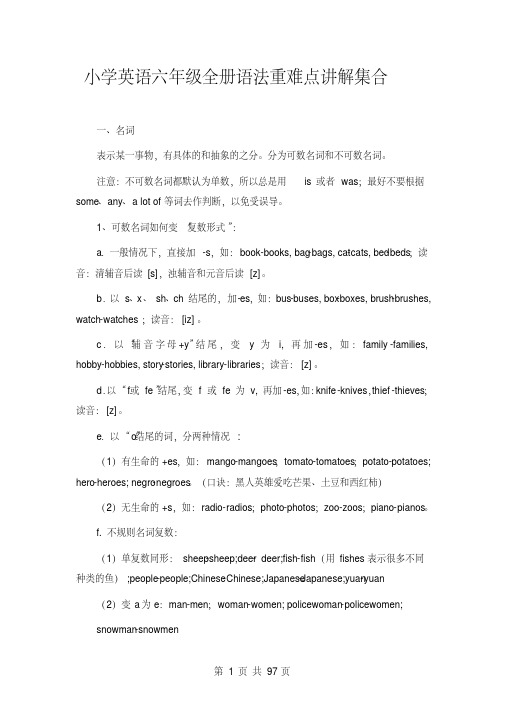
小学英语六年级全册语法重难点讲解集合一、名词表示某一事物,有具体的和抽象的之分。
分为可数名词和不可数名词。
注意:不可数名词都默认为单数,所以总是用is 或者was;最好不要根据some、any、a lot of等词去作判断,以免受误导。
1、可数名词如何变“复数形式”:a.一般情况下,直接加-s,如:book-books, bag-bags, cat-cats, bed-beds;读音:清辅音后读[s],浊辅音和元音后读[z]。
b.以s、x、sh、ch 结尾的,加-es,如:bus-buses, box-boxes, brush-brushes, watch-watches ;读音:[iz]。
c.以“辅音字母+y”结尾,变y 为i, 再加-es,如:family-families, hobby-hobbies, story-stories, library-libraries;读音:[z]。
d.以“f 或fe”结尾,变 f 或fe 为v, 再加-es,如:knife-knives,thief-thieves;读音:[z]。
结尾的词,分两种情况:e.以“o”(1)有生命的+es,如:mango-mangoes;tomato-tomatoes;potato-potatoes; hero-heroes; negro-negroes。
(口诀:黑人英雄爱吃芒果、土豆和西红柿)(2)无生命的+s,如:radio-radios;photo-photos;zoo-zoos;piano-pianos。
f. 不规则名词复数:(1)单复数同形:sheep-sheep;deer-deer;fish-fish(用fishes表示很多不同种类的鱼);people-people;Chinese-Chinese;Japanese-Japanese;yuan-yuan (2)变a为e:man-men;woman-women; policewoman-policewomen;snowman-snowmen(3)mouse-mice, child-children, foot-feet, tooth-teeth2、不可数名词没有复数。
六年级的英语语法知识点归纳

六年级的英语语法知识点归纳小学六年级英语语法讲解英语语法顺口溜:定语从句中的定从中的关系副词关系副词when/where/why, 从中做状莫懈怠;时间用when原因why,地点where经常在;定语从句中的关系副词有三个:when, where和why,它们在定语从句中分别作时间、地点和原因状语。
when指时间, where指地点,why表原因。
例如: I still remember the day when I first came to Beijing.我仍然记得我初次到北京的那天。
The factory where his father works is in the west of the city.他父亲工作的那个工厂在城市的西郊。
That is the reason why I did the job.那就是我为什么干这个活的原因。
关系副词可替换,介词加上关系代;关系副词可以由介词加上which来替换。
例如:1)This is the house where (in which) I lived two years ago.在这句中,where= in which2) Do you remember the day when (on which) you joined our club在这句中,when= on which3) This is the reason why (for which) he came late.在这句中,reason= for which关系代,关系代,that与who要除外;挑选介词要聪明,必看动词和先行;介词后可用关系代词,但只能用which或whom,不能用that 和who。
那么,这个介词怎么选呢其一,可以看定语从句中的谓语动词;其二,可以看先行词。
例如:1) The pain from which the poor suffered in this area has attractedthe attention of the public.本句中用from 加 which, from与定语从句中的谓语动词搭配,suffer from。
(完整版)外研版小学英语六年级上册语法知识点总结
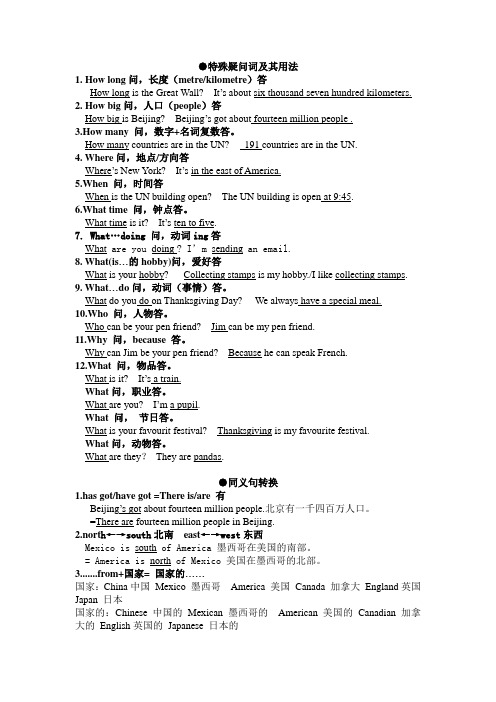
●特殊疑问词及其用法1. How long 问,长度(metre/kilometre)答How long is the Great Wall? It’s about six thousand seven hundred kilometers.2. How big 问,人口(people)答How big is Beijing? Beijing’s got about fourteen million people .3.How many 问,数字+名词复数答。
How many countries are in the UN? 191 countries are in the UN.4. Where问,地点/方向答Where’s New York? It’s in the east of America.5.When 问,时间答When is the UN building open? The UN building is open at 9:45.6.What time 问,钟点答。
What time is it? It’s ten to five.7. What…doing 问,动词ing答What are you doing ? I’m sending an email.8. What(is…的hobby)问,爱好答What is your hobby? Collecting stamps is my hobby./I like collecting stamps. 9. What…do问,动词(事情)答。
What do you do on Thanksgiving Day? We always have a special meal.10.Who 问,人物答。
Who can be your pen friend? Jim can be my pen friend.11.Why 问,because 答。
六年级英语下册知识讲义-语法精讲(Units 4- 6 复习)-湘少版

学习目标1. 能够掌握动名词作主语的用法。
2. 能够掌握一般将来时的含义和用法。
3. 能够掌握形容词作宾语补足语的用法。
4. 能够掌握一般过去时的含义和用法。
重点:能够运用动名词作主语,形容词作宾语补足语来正确描述物体。
难点:熟练运用一般将来时和一般过去时表达过去和将来发生的事情。
考点精讲1. Planting trees is good for us. 植树对我们有益。
本句中的主语是动名词短语planting trees。
当动名词(短语)作主语时,谓语动词用单数形式。
Exercising is good for our health. 锻炼对我们的健康有益。
_________ every day ________ a good habit.A. Read; isB. Reading; isC. Reading; are答案:B思路分析:句意为“每天阅读是一个好习惯。
”作主语的应为动名词;且动名词短语作主语时,谓语动词用单数形式,故选B项。
2. I will plant trees. 我将种树。
本句是含有一般将来时的肯定陈述句。
一般将来时由“助动词will +动词原形”构成。
助动词will没有人称和数的变化。
He will go to the cinema this evening. 今天晚上他将去看电影。
—_________ they play the piano for tomorrow’s party?—Yes, they _________.A. Do; doB. Did; didC. Will; will答案:C思路分析:根据“tomorrow’s party”可知时态用一般将来时,故选C项。
3. Trees can keep the air clean. 树木可以保持空气清新。
Trees can make the place beautiful. 树木可以让这个地方美丽。
keep the air clean 和make the plane beautiful都是“动词+宾语+形容词”结构。
人教版PEP小学英语六年级上册重点句型及语法知识汇总

人教版PEP小学英语六年级上册重点句型及语法知识汇总Unit 1 How can I get there?重点单词XXX。
post office邮局,XXX。
XXX。
XXX。
crossing十字路口。
turn left左转。
turn right右转。
gostraight直走。
map地图。
compass指南针。
GPS全球定位系统。
stars星星。
XXX意大利餐厅。
getto到达。
重点句型1.---Where is the restaurant?餐厅在哪里?It’s next to the park on Dong fang Street.它在东方路,在公园附近。
2.---How can we get there?我们怎么去哪里?XXX left XXX.书店左转,然后病院右转。
3.He now has GPS.他现在有GPS。
4.What an interesting film!何等风趣的片子!方位词复:XXX紧挨着,near在。
邻近,XXX在。
背面,XXX在。
旁边,in front of在。
前面。
Unit 2 Ways to go to school重点单词on foot走路。
by bike骑车。
by bus乘公交。
by train乘火车。
XXX乘地铁。
by ship搭船。
by XXX乘飞机。
slow down 慢下来。
XXX交通灯。
traffic rules交通划定规矩。
go/come to school上学。
by sled坐雪橇。
byferry坐轮渡。
pay n to留意。
traffic lights交通灯。
and wait at a red light红灯停等一等。
slow downand。
at a yellow light黄灯减速并停下。
Go XXX。
重点句型1.---How do you come to school?你怎么上学?----Usually。
I come on foot.通常我走路来的。
PEP小学英语六年级上册重点难点
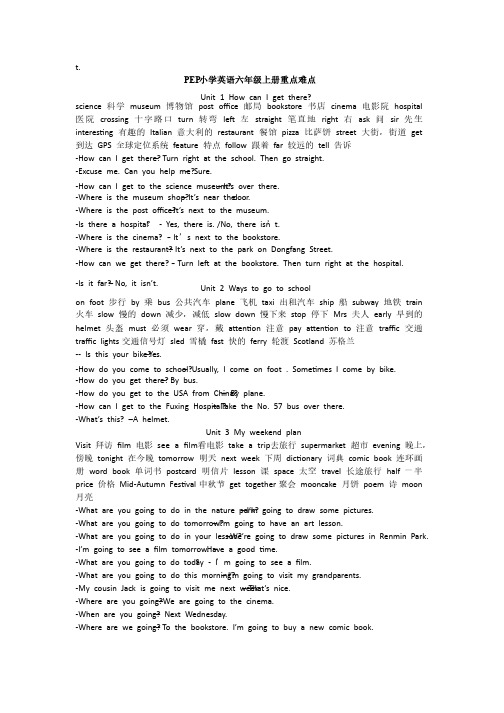
t. PEP 小学英语六年级上册重点难点Unit 1 How can I get there? science 科学科学 museum 博物馆博物馆 post post office office 邮局邮局 bookstore 书店书店 cinema 电影院电影院 hospital 院医院 crossing 十字路口十字路口 turn 转弯转弯 le 左 straight 笔直地笔直地 right 右 ask 问 sir 生先生 interes ng 有趣的有趣的 Italian 意大利的意大利的 restaurant 餐馆餐馆 pizza 比萨饼比萨饼 street 大街,街道大街,街道 get 到达到达 GPS 全球定位系统全球定位系统 feature 特点特点 follow 跟着跟着 far 较远的较远的 tell 告诉告诉-How can I get there? – Turn right at the school. Then go straight. -Excuse me. Can you help me? – Sure. -How can I get to the science museum? – It’s over there. -Where is the museum shop? – It’s near the door . -Where is the post office? –It’s next to the museum.-Is there a hospital ? - Yes, there is. /No, there isn ’t. -Where is the cinema? –It ’s next to the bookstore. -Where is the restaurant? – It’s next to the park on Dongfang Street.-How can we get there? –Turn le at the bookstore. Then turn right at the hospital. -Is it far? – No, it isn’t. Unit 2 Ways to go to school on on foot foot 步行步行 by 乘 bus 公共汽车公共汽车 plane 飞机飞机 taxi 出租汽车出租汽车 ship 船 subway 地铁地铁 train 火车火车 slow 慢的慢的 down 减少,减低减少,减低 slow slow down down 慢下来慢下来 stop 停下停下 Mrs 夫人夫人 early 早到的早到的helmet 头盔头盔 must 必须必须 wear 穿,戴穿,戴 a en on 注意注意 pay pay a en on a en on a en on to to 注意注意 traffic 交通交通 traffic lights 交通信号灯交通信号灯 sled 雪橇雪橇 fast 快的快的 ferry 轮渡轮渡 Scotland 苏格兰苏格兰-- Is this your bike? –Yes. -How do you come to school? – Usually, I come on foot . Some mes I come by bike. -How do you get there? – By bus. -How do you get to the USA from China? – By plane. -How can I get to the Fuxing Hospital? – Take the No. 57 bus over there. -What’s this? – A helmet. A helmet. Unit 3 My weekend plan Visit 拜访拜访 film 电影电影 see a film 看电影看电影看电影 take a trip 去旅行去旅行去旅行 supermarket 超市超市 evening 晚上,傍晚傍晚 tonight 在今晚在今晚 tomorrow 明天明天 next next week week 下周下周 dic onary 词典词典 comic comic book book 连环画册 word word book book 单词书单词书 postcard 明信片明信片 lesson 课 space 太空太空 travel 长途旅行长途旅行 half 一半一半 price 价格价格 Mid-Autumn Fes val 中秋节中秋节 get together 聚会聚会 mooncake 月饼月饼 poem 诗 moon 月亮月亮-What are you going to do in the nature park? – I’m going to draw some pictures.-What are you going to do tomorrow? – I’m going to have an art lesson.-What are you going to do in your lesson? –We’re going to draw some pictures in Renmin Park. -I’m going to see a film tomorrow. – Have a good me. -What are you going to do today - I ’m going to see a film. -What are you going to do this morning? – I’m going to visit my grandparents.-My cousin Jack is going to visit me next week. – That’s nice.-Where are you going? –We are going to the cinema. -When are you going? – Next Wednesday. -Where are we going? – To the bookstore. I’m going to buy a new comic book.Unit 4 I have a pen pal Studies (study 的第三人称单数形式)学习的第三人称单数形式)学习 puzzle 谜 hiking 远足远足 pen pal 笔友笔友 hobby 业余爱好爱好 jasmine 茉莉茉莉 idea 想法,主意想法,主意 amazing 令人惊奇的令人惊奇的 shall 表示征求意见表示征求意见 goal 射门射门 join 加入加入 club 俱乐部俱乐部 share 分享分享-What are his hobbies? – He likes doing kung fu and swimming. -Does he live on the South Island? – Yes, he does. He lives on a farm. -What are Peter’s hobbies? – He likes reading stories. -What are his hobbies? – He likes flying kites and singing English songs. -What are your hobbies? – I like reading stories. -What are your hobbies? – I like singing and dancing. -What are you doing? – I’m wri ng an email to my new pen pal in Australia.-Does he live in Sydney? –No, he does n’t.-Does he like doing word puzzles and going hiking? –Yes, he does. -Can I also be his pen pal? – Sure. -Does he live in China, too? – No, he doesn’t.Unit 5 What does he do? Factory 工厂 worker 工人 postman 邮递员 businessman 商人 police officer 警察 fisherman 渔民渔民 scien st 科学家科学家 pilot 飞行员飞行员 coach 教练教练 country 国家国家 head head teacher teacher 校长 sea 大海大海 stay 保持保持 university 大学大学 gym 体育馆体育馆 if 如果如果 reporter 记者记者 use 使用使用 type 打字打字 quickly 迅速地迅速地 secretary 秘书秘书-Where does he work? – He works near the sea. - How does he go to work? –By car . -Is your father here today? – No. He’s in Australia.-What does he do? – He’s a businessman. -What does your mother do? – She’s a head teacher.-Do you want to be a head teacher? – No, I want to be a businessman. -Is your father a post man? – No, he isn’t.-What does he do? – He’s a businessman.-What does Zhang Peng’s mother do? – She’s a businesswoman.-Where does he work? – He works at sea. -How does he go to work? – He goes to work by bike. -Where does she work? – She works at a university. Unit 6 How do you feel? angry 生气的生气的 afraid 害怕害怕 sad 难过的难过的 worried 担心的,担心的, 发愁的发愁的 happy 高兴的高兴的 see see a a doctor 看病看病 wear 穿 more 更多的更多的 deep 深的深的 breath 呼吸呼吸 take take a a a deep deep deep breath breath 深深吸一口气口气 count 数数数数 cont to ten 数到十数到十数到十 chase 追赶追赶 mice (mouse 的复数) 老鼠老鼠 bad 邪恶的,坏的坏的 hurt 受伤受伤 ill 有病,不舒服不舒服 wrong 有毛病有毛病 should 应该应该 feel 觉得, 感到感到 well 健康,身体好身体好 sit 坐 grass 草坪草坪 hear 听见听见 ant 蚂蚁蚂蚁 worry 担心,担忧担心,担忧 stuck 陷住,无法移动陷住,无法移动 mud 泥 pull 拉,拽拉,拽 everyone 每人每人-What’s this cartoon about? – It’s about a cat.-Why? –Because the mice are bad. -What’s wrong? – Your father is ill. Your father is ill. -How does dad feel now? – Not well. What should I do? – You should wear warm clothes. 。
小学六年级英语语法知识点汇总1
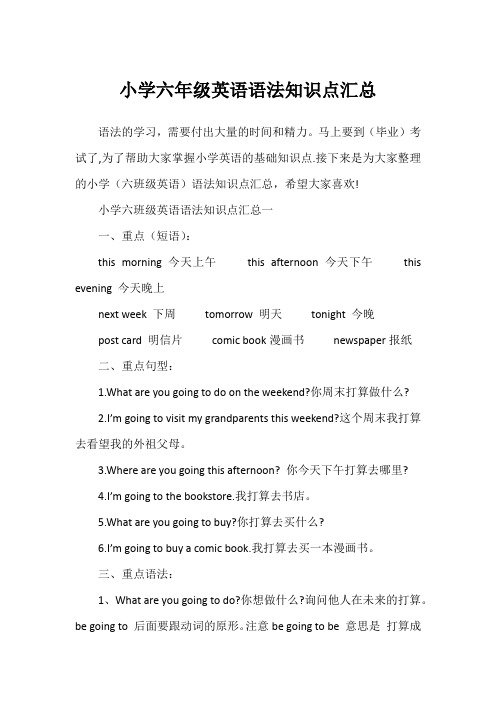
小学六年级英语语法知识点汇总语法的学习,需要付出大量的时间和精力。
马上要到(毕业)考试了,为了帮助大家掌握小学英语的基础知识点.接下来是为大家整理的小学(六班级英语)语法知识点汇总,希望大家喜欢!小学六班级英语语法知识点汇总一一、重点(短语):this morning 今天上午this afternoon 今天下午this evening 今天晚上next week 下周tomorrow 明天tonight 今晚post card 明信片comic book漫画书newspaper报纸二、重点句型:1.What are you going to do on the weekend?你周末打算做什么?2.I’m going to visit my grandparents this weekend?这个周末我打算去看望我的外祖父母。
3.Where are you going this afternoon? 你今天下午打算去哪里?4.I’m going to the bookstore.我打算去书店。
5.What are you going to buy?你打算去买什么?6.I’m going to buy a comic book.我打算去买一本漫画书。
三、重点语法:1、What are you going to do?你想做什么?询问他人在未来的打算。
be going to 后面要跟动词的原形。
注意be going to be 意思是打算成为什么,干什么职业。
注意一下(句子)的区别,找出正确回答。
What are you going to do this afternoon?What are you going to buy?What are you going to be?When? are you going?Where are you going?How are you going?Who are you going with?2、this evening 和tonight的区别:this evening指的是今天晚上睡觉以前的时间,一般指晚上十二点以前。
小学六年级英语(上册)知识归纳|人教版 笔记 重点
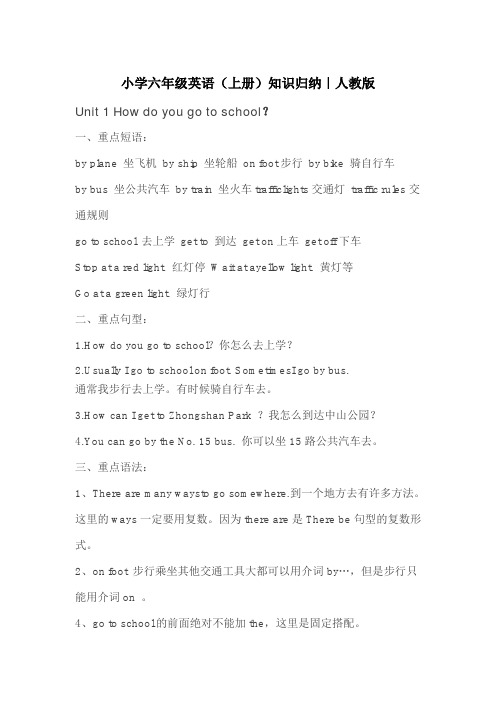
小学六年级英语(上册)知识归纳|人教版Unit 1 How do you go to school?一、重点短语:by plane 坐飞机by ship 坐轮船on foot步行by bike 骑自行车by bus 坐公共汽车by train 坐火车trafficlights交通灯traffic rules交通规则go to school 去上学get to 到达get on上车get off下车Stop at a red light. 红灯停Wait at ayellow light. 黄灯等Go at a green light. 绿灯行二、重点句型:1.How do you go to school?你怎么去上学?ually I go to school on foot. SometimesI go by bus.通常我步行去上学。
有时候骑自行车去。
3.How can I get to Zhongshan Park ?我怎么到达中山公园?4.You can go by the No. 15 bus. 你可以坐15路公共汽车去。
三、重点语法:1、There are many waysto go somewhere.到一个地方去有许多方法。
这里的ways一定要用复数。
因为there are是There be句型的复数形式。
2、on foot 步行乘坐其他交通工具大都可以用介词by…,但是步行只能用介词on 。
4、go to school的前面绝对不能加the,这里是固定搭配。
5、USA 和US 都是美国的意思。
另外America也是美国的意思。
6、go to the park 前面一定要加the. 如果要去的地方有具体的名字,就不能再加the ,如果要去的地方没有具体名字,都要在前面加the. (go to school除外。
)7、How do you go to …?你怎样到达某个地方?如果要问的是第三人称单数,则要用:How does he/she…go to …?8、反义词:get on(上车)---get off(下车)near(近的)—far(远的)fast(快的)—slow(慢的)because(因为)—why(为什么)same(相同的)—different(不同的)9、近义词:see you---goodbye sure---certainly---ofcourse10、频度副词:always 总是,一直usually 通常often经常sometimes 有时候never 从来不Unit 2 Where is the science museum?一、重点短语:library 图书馆post office 邮局hospital医院cinema 电影院bookstore书店science museum科学博物馆turnleft向左转turn right 向右转go straight 直行north北south南east东west西next to靠近、与……。
小学英语六年级下册单元知识点、重难点梳理
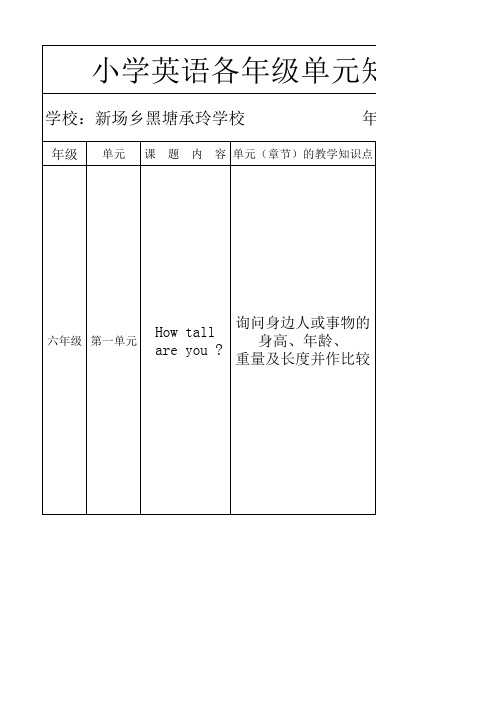
过
2.重点句型: How was your weekend? It was good, thank you.
的一般 现
What did you do? I stayed at home with your grandma. We drank tea in the afternoon and watched TV.
.
(4)Before ,I was quite .Now I am very active .
和新学 的一般
I stayed at home all weekend and slept.
过去时
做对 3.掌握一般过去时的定义、构成及动词过去式的变化规则
。
4.能用一般过去时表述已做过的事情。 5.能询问对方过去所做的事。 6.正确地评价自己的生活和学习习惯。
比,让 学生巩
固旧知 难点:
1.掌握本单元重点单词、短语、句型,通过掌握一般过去
小学英语各年级单元知识点、重
学校:新场乡黑塘承玲学校 年级:六年级
年级 单元 课 题 内 容 单元(章节)的教学知识点
六年级 第一单元
How tall are you ?
询问身边人或事物的 身高、年龄、
重量及长度并作比较
第二单元
Last weekend
询问别人上 周末的活动
六年级 第三单元
1.重点单词:
dining hall 饭厅 grass 草坪
gym 体育
馆ago 以前 badminton 羽毛球运动 cycling 骑自行
车运动 ice—skate 滑冰
badminton 羽毛球运动
go cycling 去骑自行车 play badminton 打羽毛球
译林版小学英语六年级上册全册知识点梳理
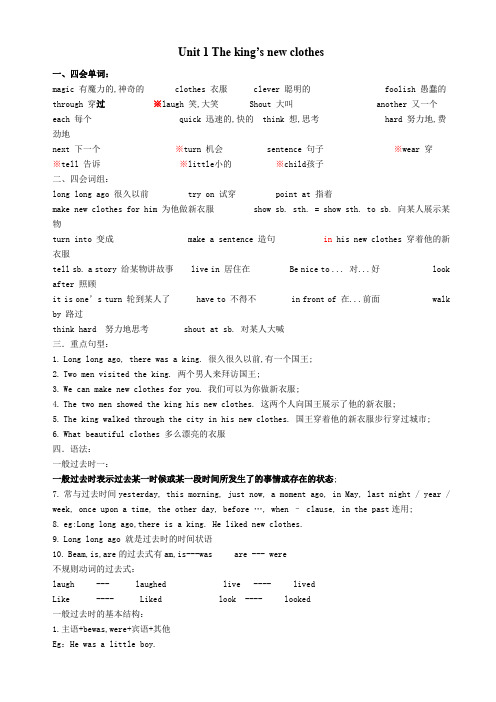
Unit 1 The king’s new clothes一、四会单词:magic 有魔力的,神奇的 clothes 衣服 clever 聪明的 foolish 愚蠢的through 穿过※laugh 笑,大笑 Shout 大叫 another 又一个each 每个 quick 迅速的,快的 think 想,思考 hard 努力地,费劲地next 下一个※turn 机会 sentence 句子※wear 穿※tell 告诉※little小的※child孩子二、四会词组:long long ago 很久以前 try on 试穿 point at 指着make new clothes for him 为他做新衣服 show sb. sth. = show sth. to sb. 向某人展示某物turn into 变成 make a sentence 造句in his new clothes 穿着他的新衣服tell sb. a story 给某物讲故事 live in 居住在 Be nice to ... 对...好 look after 照顾it is one’s turn 轮到某人了 have to 不得不 in front of 在...前面 walk by 路过think hard 努力地思考 shout at sb. 对某人大喊三.重点句型:1.Long long ago, there was a king. 很久很久以前,有一个国王;2.Two men visited the king. 两个男人来拜访国王;3.We can make new clothes for you. 我们可以为你做新衣服;4.The two men showed the king his new clothes. 这两个人向国王展示了他的新衣服;5.The king walked through the city in his new clothes. 国王穿着他的新衣服步行穿过城市;6.What beautiful clothes 多么漂亮的衣服四.语法:一般过去时一:一般过去时表示过去某一时候或某一段时间所发生了的事情或存在的状态;7.常与过去时间yesterday, this morning, just now, a moment ago, in May, last night / year / week, once upon a time, the other day, before …, when – clause, in the past连用;8.eg:Long long ago,there is a king. He liked new clothes.9.Long long ago 就是过去时的时间状语10.Beam,is,are的过去式有am,is---was are --- were不规则动词的过去式:laugh --- laughed live ---- livedLike ---- Liked look ---- looked一般过去时的基本结构:1.主语+bewas,were+宾语+其他Eg:He was a little boy.2.主语+动词的过去式+宾语+其他Eg: We brought some bread and honey to the park.Unit 2 What a day一.四会单词:※sunny 晴朗的※windy 有风的※cloudy 多云的※rainy 有雨的weather 天气※become 变成,变为honey 蜂蜜 drink 饮料※Sky 天空※bring 带来bread 面包※meet 遇见ant 蚂蚁 high 在高处※meet 遇见 know 知道cloud 云 rain 下雨lose 丢失 parrot 鹦鹉show 展览,展示 interesting 有趣的,有意思的二.重点词组:A parrot show 一场鹦鹉表演 fly kites/a kite 放风筝By bike = ride a bike 骑自行车 high in the sky 在高空中Rain all day 下了一整天的雨 well done 干得好Look sad 看起来伤心 fly away 飞走Fly high 飞得高 black clouds 乌云Become windy and cloudy 变得有风多云What happened 出什么事了climb up 爬上 hold onto 抓紧Watch a film看电影 do housework 做家务Have a picnic 野餐 on Monday morning 在星期一早上三.重点句型:1.What a day 多么糟糕的一天2.The weather became windy and cloudy. 天气变得多风且多云;3.What’s the matter with sb. = What’s wrong with sb. 某人怎么了/出什么事了四.语法:一般过去时二:不规则动词过去式:Becomebecame can could go went take tookBringbrought fly flew see saw lose lostClimb climbed happen happened find found wantwantedUnit 3 Holiday fun一.四会单词:※holiday 假日,假期 call 打电话 Bund 上海外滩star 星星※Excited 激动的※paper 纸※Ask 问※bottle 瓶子二.重点词组:Shanghai Museum 上海博物馆※Great Wall 长城※National Day 国庆节 Palace Museum 故宫Summer Palace 颐和园※At first 首先Tian‘anmen Square 天安门广场 a fashion show 一场时装秀※heavy rain 大雨 Come back to school 回到学校 the summer holiday 暑假※go well 进展顺利Pick some oranges 摘桔子 be excited about 对...感到兴奋Ask about 问关于...的情况 wear paper clothes 穿纸衣服 holiday fun 假期趣事It is time to do sth.= it is time for sth.到做某事的时间了二.重点句型:1.What did you/he do for the holiday 你/他假期做过什么2.He visited the Shanghai Museum. 他参观了上海博物馆;3.Did you go fishing 你去钓鱼了吗Yes, I did./ No, I didn’t.4.Where did you go for the holiday 你去哪儿度假的啊5.I saw many interesting things.我看到很多有趣的东西;6.How was your holiday 你的假期过得怎么样7.We picked some oranges and went fishing.我们摘了很多橘子和去钓鱼;三.语法一般过去时三不规则动词过去式Catchcaught dodid eatate getgotWearwore havehadUnit 4 Then and now一.四会单词:radio 收音机※ago ……以前use 用※watch观看telephone 电话※office 办公室※newspaper 报纸※news 新闻※e-book 电子书※with 用anywhere 随处,到处※yesterday 昨天televisionTV电视二.重点词组:read e-book 读电子书 listen to the radio 听收音机go on 继续 on the Internet 在网上Buy things from shops 从商店买东西do many things 做很多事 work hard 努力工作make friends 交朋友 all over the world 全世界do shopping 购物 look out of 朝……外看spell 拼读,拼写 make a sentence 造句then and now 过去和现在 wait for 等待mobile phone 移动电话,手机 get angry 变得生气三.重点句型1.He used the telephone at home and in the office to call people.他在家在办公室都是用座机给人们打电话;2.Mike’s grandpa listened to the radio and read newspapers for news.麦克的爷爷通过听收音机和看报纸获取新闻;3.She bought things from shops. 他从商店买东西;4.Now she has e-friends from all over the world.现在他有来自世界各地的朋友;4..What day is today今天是星期几四.语法一般过去时四不规则动词过去式:Can could get gotRead read 同音异形本课主要是一般过去时时态讲解的总结Unit 5 Signs一.四会单词:※sign标识※careful 小心,当心※mean 意思是※floor 地面litter 乱扔垃圾 restaurant餐馆someone 某人 smoke 吸烟smell 闻到 outing 外出游玩※around 在...周围二.重点词组:No eating or drinking 禁止吃喝be careful 小心,当心No littering 禁止扔垃圾want to do sth 想要做某事No parking 禁止停车go in 进入No smoking 禁止吸烟take...into...把...带进...里Danger 有危险※at a shopping center 在购物中心Wet floor 小心地滑be on an outing 远足No feeding 禁止喂食 in the forest 在森林里No walking 禁止踩踏tired and hungry 又累又饿No climbing trees 禁止爬树 look for 寻找No shouting 禁止大喊 a sign on a tree 树上的标识No swimming 禁止游泳walk on 继续走路No picking flowers 禁止摘花No fishing 禁止钓鱼三.重点句型:1.What does this sign mean 这个标识是什么意思2.It means the floor is wet.3.It is time for lunch. 到吃午饭的时间了;4.Bobby gives Sam a banana. give sb. sth.= give sth. to sb.三.语法:What does it meanIt means the floor is wet.它的意思是地滑;It means you can’t eat or drink there. 意思是你不能在那里吃喝Unit 6 Keep our city clean 一.重点单词或词组※keep 保持※clean 干净的※make 使...变得※dirty 脏的 air空气 Smoke 烟※ground 地面 rubbish 垃圾 dead死的messy 乱的 bin垃圾桶 plant种植More更多 museum博物馆 throw扔Skin果皮 slip 滑倒 fall 摔倒二.重点词组Keep our city clean 保持城市清洁the pictures of our city 我们城市的图片Make the air dirty 使空气脏Take the bus and the metro to school 乘公交和地铁去学校Walk to school 步行去学校Move some factories away from 把一些工厂移走Put rubbish in the bin 把垃圾放入垃圾桶Throw...on the ground 把...放在地面上Plant more trees 种更多的树 walk home 步行回家Well done 干得好 live in the city 住在城市Banana skin 香蕉皮 Pick up 捡起来slip on 滑倒 Go to hospital 去医院三.语法:1.What makes the air dirty 什么使空气变脏Smoke makes the air dirty. 废气使空气变脏;2.What can we do to keep our city cleanWe can take the bus and the metro to school.Unit 7 Protect the Earth 一、四会单词:Protect地球 earth地球 save节约※useful有用的※Much很多 waste浪费reuse再利用 energy能源 Most 大部分coal煤炭※oil石油※drive 开车,驾车※Wood木头※other其他的 plastic塑料glass玻璃 Project课题 poster海报gate 大门二、重点词组Come from 来自 cut down 砍伐too many 太多 save water 节约用水drink water 喝水 use water用水Every day 每天 in many places在许多地方Much water 大量的水 waste water 浪费水Save energy 节约资源 on earth在地球上A lot of energy 许多能源 make tables制作桌子Too much太多 too many 太多Be bad for 对...有害 plastic bags 塑料袋Glass bottles玻璃瓶 do a project 做课题Make a poster 制作海报 on the trees 在树上At the school gate在学校大门口 protect the Earth 保护地球三、重点句型1.We use water/plastic/wood/...to... 我们使用水,塑料,木材做...2.We should/shouldn’t...我们应该、不应该...3.In many places, there is not much water.在许多地方,没有足够的水;4.Most of our energy comes from coal and oil. 我们的大部分能源来自煤和石油;5.We should not drive so much because cars use a lot of energy. 我们不应该开车太多,因为汽车要使用许多能源;6.Too much plastic is bad for the Earth.太多的塑料对地球有害;7.We should protect the Earth and keep it clean.我们应该保护地球,让它保持干净;四、语法1.We use water/plastic/wood/...to... 我们使用水,塑料,木材做...Should/shouldn’t 应该/不应该We should use paper bags and glass bottles./save trees.We should not drive too much.Unit 8 Chinese New Year一.四会单词:※Get 收到※food 食物※Rich 富裕的※plan 计划firecrackers 爆竹 fireworks烟花二.重点词组Hong Kong 香港on Chinese New Year’s Day 在春节这天Next week 下周Chinese New Year’s Eve 大年夜,除夕Red packet 红包 lion dance 舞狮Make some cakes 做一些蛋糕 have dinner with sb.与某人吃饭Get sth from sb. 收到某人某物 at Chinese New Year 在春节The most important festival 最重要的节日Cook dumplings 煮饺子 get the red packet 收到红包After dinner 晚饭后 talk about 谈论Watch fireworks 看烟花 in the kitchen 在厨房里三.重点句型1.Chinese New Year is coming.春节就要到了;2.Suhai gets an email from her e-friend Anna in Hong Kong.苏海收到了她来自香港的网友的邮件;3.On Chinese New Year’s Eve,we’re going to have dinner with my grandparents,my aunt and uncle and my cousin. 在除夕夜,我们将和我的爷爷奶奶,叔叔阿姨和表姐一起吃年夜饭;4.On Chinese New Year’s Day,my parents are going to give me red packets.在新年这天,我的父母将要给我红包;5.What are you going to do at Chinese New Year 你春节将要做什么四.语法一般将来时:Be going to 结构,后面接动词原形,表示“将要做某事”常常与时间状语:tomorrow,next week等;1.用来表示按照计划或安排要发生的动作,有“准备,打算”的意思;这种主观意图,一般已做过事先安排,故其实现的可能性较大,其主语常常是人;eg: We are going to have a class meeting this afternoon. 今天下午我们打算开班会2.表示根据现有情况、某种迹象,判断将要或即将发生的动作;此时不含有主观意图,只是表示说话人对客观事态发展的判断或推测,此时主语可以是人,也可以是物;eg: It is going to be Chinese New Year next week.3.Be coming 表示“即将到来”,也有将来之意Eg:Chinese New Year is coming. 春节即将来临;He is coming. 他马上就来;。
小学人教PEP英语六年级上册重点单词、短语、句型汇总
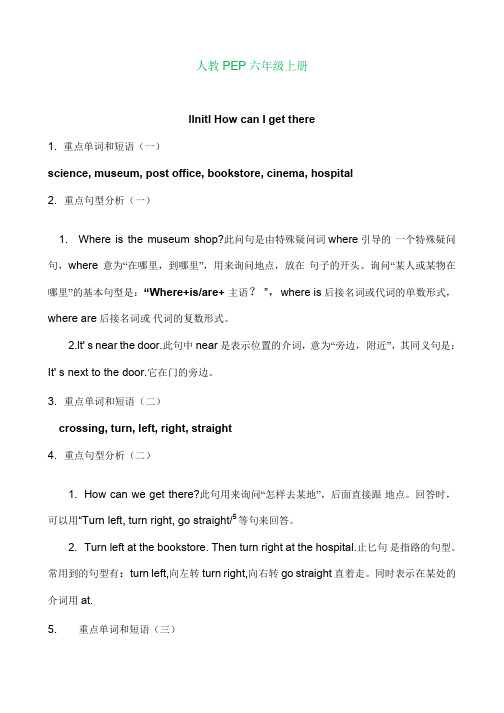
人教PEP六年级上册llnitl How can I get there1. 重点单词和短语(一)science, museum, post office, bookstore, cinema, hospital2. 重点句型分析(一)1. Where is the museum shop?此问句是由特殊疑问词where引导的一个特殊疑问句,where意为“在哪里,到哪里”,用来询问地点,放在句子的开头。
询问“某人或某物在哪里”的基本句型是:“Where+is/are+ 主语?”,where is后接名词或代词的单数形式,where are后接名词或代词的复数形式。
2.lt' s near the door.此句中near是表示位置的介词,意为“旁边,附近”,其同义句是:It' s next to the door.它在门的旁边。
3. 重点单词和短语(二)crossing, turn, left, right, straight4. 重点句型分析(二)1. How can we get there?此句用来询问“怎样去某地”,后面直接跟地点。
回答时,可以用“Turn left, turn right, go straight/5等句来回答。
2. Turn left at the bookstore. Then turn right at the hospital.止匕句是指路的句型。
常用到的句型有:turn left,向左转turn right,向右转go straight直着走。
同时表示在某处的介词用at.5. 重点单词和短语(三)Tasty, buy, London Eye, next to, far from, go straight, turn left, stomach 6. 重点句型分析(三)Is the Thames far from here? No.此句是个be动词开头的一般疑问句,其回答要用yes或no.句中的far from意为“离 ............................................. 远”。
小学英语人教精通版六年级下册重点归纳

小学英语人教精通版六年级下册重点归纳第一单元Unit1 I went to Sanya for my holidays.重点单词:Sun 太阳moon月亮star星星Learn 学习;学到word 单词;词blackboard黑板say 说subject学科but 但是yesterday昨天why 为什么use用重点短语:1.by plane 乘飞机2.at night 在晚上3.at home 在家里4.a lot of 很多5.go to the beach 去沙滩6.do tasks 做任务7.act in drama 表演戏剧8.stay at home 待在家里9.have a party 聚会10.enjoy Spring Festive 过春节11.listen to music 听音乐12.speak English 讲英语13.read English 读英语14.write E n glish 写英语15.talk in English n用英语交谈16.play in English 用英语玩游戏17.enjoy sunbathing享受日光浴18.have an English party举办英语聚会19.enjoy the moon and stars看月亮和醒醒20.learn from each other 互相学习。
重点句型:1. We have learned a lot of English words我. 们学了很多英语单词。
2. We learned from each other我. 们互相学习。
2.What did you do for your holidays?你假期做了什么?3.I went to Sanya.我去了三亚。
4.We are very interested in English我. 们对英语很感兴趣。
5.How did you learn English?你(们)是怎么学英语的?6.We learned English by doing things我. 们通过做事情来学英语。
(完整版)小学六年级英语语法知识汇总

(完整版)小学六年级英语语法知识汇总小学六年级英语语法知识汇总一、词类:1、动词:行为动词、be动词、情态动词。
(1)行为动词原形、+s/es、+ed、+ing,具体推断办法如下:(2)be动词a、Am--was Is --was Are--were 口诀:我用am, 你用are, is用在他她它,所有复数全用are。
b、确信和否定句I am (not) from London. He /She is(not) a teacher. My hair is(not) long. Her eyes are(not) small.c、普通疑咨询句Am I …? Yes, you are. No, you aren’t. Are you/they…? Yes,w e/ they are. No,we/ they aren’t. Is the cat fat? Yes, it is. No, it isn’t.is、am、are为一类,普通用于普通如今时、如今举行时和普通未来时中。
was和were为另一类,普通用于普通过去时。
(3)情态动词can、must、should、would、may。
情态动词后动词总是用原形。
(别受其他任何条件妨碍)2、名词这个地方强调两点:别可数名词都默以为单数,因此总是用is或者was。
怎么加后缀:a.普通事情下,直截了当加-s,如:book-books, bag-bags, cat-cats, bed-bedsb.以s. x. sh. ch结尾,加-es,如:bus-buses, box-boxes, brush-brushes, watch-watchesc.以“辅音字母+y”结尾,变y为i, 再加-es,如:family-families,strawberry-strawberriesd.以“f或fe”结尾,变f或fe为v, 再加-es,如:knife-knivese.别规则名词复数:man-men, woman-women, policeman-policemen, policewoman-policewomen, mouse-mice child-childrenfoot-feet ,.tooth-teeth fish-fish, people-people, Chinese-Chinese, Japanese-Japanese3、形容词(包括副词)形容词表示某一事物或的特征,副词表示某一动作的特征。
PEP小学英语六年级上下全册知识点总结
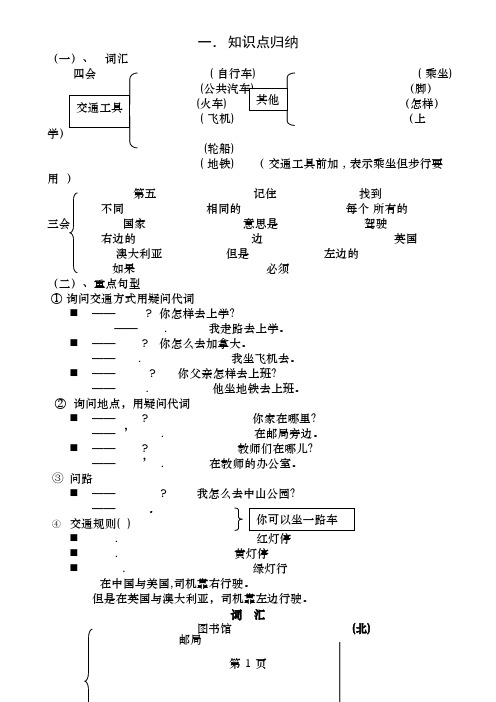
一. 知识点归纳(一)、 词汇乘坐) (脚)火车(怎样) 飞机(上轮船) ( 地铁) ( 交通工具前加 , 表示乘坐但步行要用 )第五 记住 找到不同 相同的 每个 所有的三会 国家 意思是 驾驶右边的 边 英国 澳大利亚 但是 左边的 如果 必须(二)、重点句型① 询问交通方式用疑问代词⏹ —— ? 你怎样去上学?—— . 我走路去上学。
⏹ —— ? 你怎么去加拿大。
—— . 我坐飞机去。
⏹ —— ? 你父亲怎样去上班?—— . 他坐地铁去上班。
② 询问地点,用疑问代词⏹ —— ? 你家在哪里?—— ’ . 在邮局旁边。
⏹ —— ? 教师们在哪儿?—— ’ . 在教师的办公室。
③ 问路⏹ —— ? 我怎么去中山公园?—— .④ 交通规则( )⏹ ⏹ . 黄灯停 ⏹ . 绿灯行在中国与美国,司机靠右行驶。
但是在英国与澳大利亚,司机靠左边行驶。
词 汇图书馆 (北) 邮局医院: 电影院(地点) 书店 (东) (西)科学博物馆银行学校(南)超市鞋店在哪里请与…相邻右边,正确的左边成直线地然后转弯对不起想要双分钟告诉乘坐远放学以后上车下车第十二聚会;晚会开始买句型一、问路. , ? 请问电影院在哪儿?. 在医院的旁边。
. 在学校的前面.在公园的后面’ . 在动物园的附近.. 在书店的左右边.. 在银行的东边.. 离这儿很远.. , 请问这附近有电影院吗?, . 有.. ? 我该怎样到达医院呢?二、指引路. . 你可乘坐路公交车去那儿.. …在…地方上车下车.. . 向前直走在分钟.. …在…地方向右左转.朝东西南北走…分钟.三 ? 离这儿远吗?一.知识点归纳(一)、词汇四会下周报纸今天上午漫画书今天下午杂志(时间 ) 今天晚上字典今夜明信片明天去旅游主题公园买一些水果宠物店(活动)去看电影(其他)水果摊参观长城鞋店阅读有关植物的杂志商店三会:忙碌的一起地需要其他二、重点句式与句型:本单元中出现的一个重点语法项目是一般将来时:表示将要发生的动作或状态,常与表示将来的时间连用。
人教版六年级全册各单元语法重点

人教版六年级全册各单元语法重点上册各单元语法重点Unit 1 How can I get there?我如何能到达那里?题解:How“如何”对方式提问,can情态动词五年级学过“能”语法点(一)课本1.There be 结构的复习(be动词的单复数)There be 结构中be系动词的单复数应根据后面最靠近的名词的单复数决定如:There is a bag on the desk (a bag 一个包单数,所以be用is)There are two books on the desk(two books 两本书,复数,所以be用are)There is a bag and two books on the desk (be动词就近一致原则)2.乘坐交通工具用介词by,但步行时用on3.go to the park前一定要加the,但如果去的地方有具体名字就不能加the,另外go to school是固定搭配,前面也不加the4.how 对方式进行提问,本单元询问用哪种交通工具.how do you go to school?I go to school by bus/bike。
I go to school on footHow do you go to…?你怎样到达某个地方?如果要问的是第三人称单数,则要用:How does he/she go to school?do要变成does(与一般现在时单三人称保持一致) 回答方式:he/she goes to school by bike/bus/on foot等(二)询问某地有…店Where is the+地点名词It is+方位介词+地点名词It is next to/in front of/behind./near/on the left/right of the+地点名词方位介词(短语)语意辨析后的实际应用如:where is the bookshop?It is next to/in front of/behind./near/on the left/right of the+ hospital方位介词如下:next to紧挨着,紧靠着in front of 在..前面behind 在…后面near 在…附近on the left/right of the 在…的左边/右边unit 2 ways to go to school语法点(一)现实生活中应用这些结构询问某处,指路等1.Where is + 地点? 询问地点的句型。
小学英语人教精通版六年级上册重点归纳

小学英语人教精通版六年级上册重点归纳第一单元Unit 1 I go to school at 8:00重点单词:lunch 午餐dinner 晚餐walk 走;步行every 每一个morning 早上afternoon 下午evening 晚上often 时常;常常easy 容易difficult困难重点词组:1. daily life 日常生活2. get up 起床3. in the morning 在早晨\上午4. in the afternoon 在下午5. in the evening 在晚上6. have breakfast 吃早餐7. have lunch 吃午餐8. have dinner 吃晚餐9. go to school 去上学10. go home 回家11. watch TV 看电视12. do some reading 阅读13. go to bed 睡觉14. cook breakfast 做早餐15. take a walk 散步16. teach English 教英语17. read stories 读故事18. every morning 每天早晨19. on Saturdays 在星期六20. on Sundays 在星期日21. see a film 看电影22. have piano lessons 上钢琴课23. play the piano 弹钢琴24. at home 在家25. help sb. to do the housework 帮助某人做家务26. clean the door 擦门27. clean the window 擦窗户28. clean the floor 擦地板重点句型:1.I don’t have breakfast at 7:00 in the morning . 我不是在早上七点钟吃早餐。
2.She gets up at 6:00 in the morning . 她在早上六点钟起床。
- 1、下载文档前请自行甄别文档内容的完整性,平台不提供额外的编辑、内容补充、找答案等附加服务。
- 2、"仅部分预览"的文档,不可在线预览部分如存在完整性等问题,可反馈申请退款(可完整预览的文档不适用该条件!)。
- 3、如文档侵犯您的权益,请联系客服反馈,我们会尽快为您处理(人工客服工作时间:9:00-18:30)。
小学英语六年级全册语法重难点讲解集合一、名词表示某一事物,有具体的和抽象的之分。
分为可数名词和不可数名词。
注意:不可数名词都默认为单数,所以总是用is 或者was;最好不要根据some、any、a lot of等词去作判断,以免受误导。
1、可数名词如何变“复数形式”:a.一般情况下,直接加-s,如:book-books, bag-bags, cat-cats, bed-beds;读音:清辅音后读[s],浊辅音和元音后读[z]。
b.以s、x、sh、ch 结尾的,加-es,如:bus-buses, box-boxes, brush-brushes, watch-watches ;读音:[iz]。
c.以“辅音字母+y”结尾,变y 为i, 再加-es,如:family-families, hobby-hobbies, story-stories, library-libraries;读音:[z]。
d.以“f 或fe”结尾,变f 或fe 为v, 再加-es,如:knife-knives,thief-thieves;读音:[z]。
e.以“o”结尾的词,分两种情况:(1)有生命的+es,如:mango-mangoes;tomato-tomatoes;potato-potatoes; hero-heroes; negro-negroes。
(口诀:黑人英雄爱吃芒果、土豆和西红柿)(2)无生命的+s,如:radio-radios;photo-photos;zoo-zoos;piano-pianos。
f. 不规则名词复数:(1)单复数同形:sheep-sheep;deer-deer;fish-fish(用fishes表示很多不同种类的鱼);people-people;Chinese-Chinese;Japanese-Japanese;yuan-yuan (2)变a为e:man-men;woman-women; policewoman-policewomen;snowman-snowmen(3)mouse-mice, child-children, foot-feet, tooth-teeth2、不可数名词没有复数。
如果要计算不可数名词所表达的数量,就得在数词和不可数名词之间加上“量词+of”。
一般结构为:数词+量词+of+不可数名词,复数体现在量词上,如two cups of tea(两杯茶)。
常见的不可数名词有:milk,water,juice,coffee,soup,bread,rice,hair,paper,advice,homework,news,inform ation,tea,beer等。
例如:a glass of water, a piece of paper, a bottle of juice.练一练:(一)写出下列各词的复数。
him _________ this _______ box______ watch_______mango_______child _______ photo ________ diaryday________ foot________ dress ________ tooth_______sheep ______box_______ strawberry _____ thief _______engineer______ peach______sandwich ______man______woman_______ leaf_______people________ bread(二)用所给词的适当形式填空。
1、She can sing many (song).2、Peter have three(e-friend).3、He’s six (year) old.4、Lily has gone to several foreign (country).5、Wang Bing could speak different (language).6、We have eight (lesson) every day.7、Sam and Billy talk about their (hobby).8、I have lots of good (friend) in Nanjing.9、Are there any (student) in the classroom?10、Tom has a few nice story (book).11、Millie’s mother often makes (cake) for us.12、Ted has hundreds of (toy) at home.13、Jack always has lots of good (idea).14、Our farm has fifty-four (sheep) this year.15、My parents are English (teacher).16、Teacher Wu often tells some funny (story) in class.17、All of the people here are (writer).18、The ground is full of (leave).19、The two(thief) were caught by the police.20、We all like (hero).21、He loves eating(mango) very much.22、These(tomato) are very fresh.23、We have few (potato) left.24、There are so many(child) in the kindergarten.25、Many students in this school are(Chinese).26、The book is six (yuan).27、Lily has two(glass) of milk.28、There (be )some bread on the table.29、Do you like having some(coffee).30、I have two(bowl) of rice everyday.二、冠词冠词是一种虚词,不能独立使用,通常放在名词的前面,分为“不定冠词”和“定冠词”两种。
1、不定冠词:a、an。
用在单数名词前,表示“一个,一件……”。
an 用在以元音(a/e/i/o/u)发音开头的单词前。
如:an e-mail, an orange, an old man, an English teacher, an hour…2、定冠词:the。
用在单数或者复数名词前。
the没有具体意思,表示特指某个事物。
基本用法如下:(1)用来表示特指某(些)人或某(些)事物。
如:The map on the wall is new.(2)表示说话者双方都知道的人或事物。
如:Look at the picture, please.(3)表示再次提到前面谈过的人或事物。
如:This is a stamp. The stamp is beautiful.(4)用在表示世界上独一无二的事物前。
如:the sun 太阳the moon 月亮the earth 地球(5)用在由普通名词构成的专有名词前。
如:the Great Wall 长城(6)用在江河、湖海等专有名词前。
如:the Changjiang River 长江(7)此外,序数词、形容词最高级、乐器名称等词前面和一些习惯用语中一般都用定冠词the。
如:the first day, the best boy, play the piano, in the same class。
确定用a、an 还是the 时可根据汉语意思。
定冠词的用法口诀:特指双熟悉,上文已提及;世上独无二,序数最高级;某些专有名,习语及乐器。
不用冠词的几种情况口诀:下列情况应免冠,代词限定名词前;专有名词不可数,学科球类三餐饭;复数名词表泛指,两节星期月份前;颜色语种和国名,称呼习语及头衔。
以上口诀主要概括了一般应“免冠”的几种情况,即:①名词前已有作定语用的this、that、some、any、my等限定词①专有名词和不可数名词前①表示学科的(如:maths、Chinese、physics)名词前①球类活动的名词前及三餐总称前①复数名词表示泛指(一类人或事)时①节日、季节、星期、月份前①表示颜色(如:It's red / yellow.)、语种(如:speak English/Japanese)和国家的非全称名词(如:We live in China. They come from America.)①在称呼或表示头衔的名词前①某些习惯短语中(如:in bed、go to school等)练一练:(一)用 a 或an 填空。
____ “UFO”____ ice-cream ____ goalkeeper____ teapot ____ apple____old man____office____English book ____minute____umbrella (二)根据需要,填写冠词a,an 或the。
(1)Who is ____girl behind ____tree?(2)____old man has two children, ____ son and ____daughter.(3)This is ____ orange. ____ orange is Lucy’s.(4)He likes playing ____guitar. We have ____same hobby.(5)We all had____good time last Sunday.(6)She wants to be____doctor.(7)cat can catch mice.(8)The ant is insect .(9)Lucy spends hour doing her home work everyday .(10)Bob's father is engineer .(11)John is honest boy .(12)number of teachers in our school is 77.(13)number of foreign visitors will come to Beijing next week.(14)China has population of more than 1.3 billion.(15)more you speak English, better you will be.(16)elephant is a kind of animal in Africa.三、数词我们学过两类:基数词和序数词。
